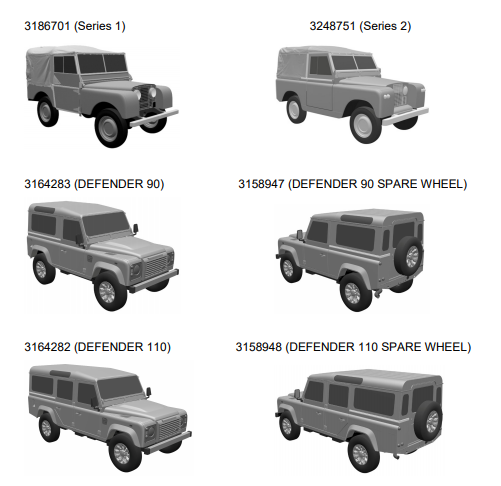Background
In 2016, Jaguar Land Rover (“JLR”) applied to register four UK trade mark applications for the shape marks of the Land Rover Defender 90 and Land Rover Defender 110 vehicles, in Classes 9, 12, 14, 28 and 37:

All four applications were successfully opposed by Ineos Industries Holdings Limited (“Ineos”) in respect of most of the applied-for goods and services on the basis of non-distinctiveness or acquired distinctiveness.
Ineos, a multinational chemical company, had been manufacturing the Land Rover Defender until 2015, after it became aware of JLR’s intention to cease mass production of the car. Ineos had offered to purchase the tooling and production equipment from JLR to continue the manufacture of the Defender. However, JLR responded by stating that it would consider any production of the Defender model as an infringement of its intellectual property rights within the shape, as well as an act of passing-off.
Appeal by JLR
JLR appealed the Hearing Officer’s decision on the basis that:
- The test of whether the marks had departed significantly from the norms and customs of the sector had not been applied correctly; and,
- The test of acquired distinctiveness had also not been applied correctly.
Inherent distinctiveness
In addition to the usual considerations taken into account when determining whether or not a mark possesses distinctive character, account must also be taken of whether or not the mark significantly departs from the norms and customs of the sector concerned when assessing the inherent distinctiveness of shape marks.
JLR relied upon expert evidence that detailed the differences in the features of the Defender vehicles, for example, the “arrow shot rear windows”, to those on other vehicles in the relevant sector, to show that its mark significantly departed from the norms and customs in the passenger car sector. The Hearing Officer had held that there were minor variations of the vehicles already existing within the sector but that these differences would most likely not be regarded as important. As such they would not be regarded as significant departures from the norms and customs of the sector by the average consumer of passenger cars.
The Hearing Officer also held that the journalistic accounts of the distinctive shape of the Defender model by motor specialists were not to be given significant weight in the assessment of inherent distinctiveness, on the basis that the motor specialists had familiarity with the Defender model. By taking such comments into consideration would be an incorrect application of the test of inherent distinctiveness, which ought to be from the perspective of the average consumer, as held by the Court.
Acquired distinctiveness
JLR also appealed against the Hearing Officer’s decision that the marks had not acquired distinctiveness through use, claiming that the Hearing Officer had carried out an incorrect assessment of acquired distinctiveness as well as an incorrect assessment of the survey evidence.
The Court held that it is reasonable for the Hearing Officer to conclude that a mark is devoid of distinctive character after carrying out an assessment of the relevant factors alone without considering any survey evidence, and for the Hearing Officer, at that stage, to go on to consider the survey evidence to see whether, on an “overall assessment of all of the evidence”, the mark may be deemed to be distinctive, in accordance with the principles laid out in Windsurfing Chiemsee [C-108 & C-109/97].
JLR also submitted that the Hearing Officer’s assessment of the evidence of the modified Defender vehicles was flawed. The Court held that the Hearing Officer was entitled to treat himself as competent to evaluate the survey evidence and therefore correct for not unequivocally accepting the expert evidence submitted on behalf of JLR.
The survey evidence showed that some participants had mentioned “LAND ROVER” upon viewing the Defender shape marks. The Court held that the Hearing Officer was correct in holding that it could not be concluded from this that the shapes are capable of indicating JLR as the trade source of the Defender vehicles, and that therefore consumers purchased the modified Defenders not because the shapes were indicative of JLR’s Defenders but rather on the basis of the modifications made by the Modifiers themselves.
Key takeaways
This case highlights the persisting difficulties for brand owners in trying to secure registered protection for non-conventional marks, particularly marks that comprise the shape of the products themselves.
Moreover, the policy considerations taken into account upon the assessment of such shape marks, namely, to avoiding granting perpetual rights for shapes that can otherwise be protected by way of time-limited intellectual property rights (e.g., copyright or design rights), make the prospect of obtaining registered protection for iconic shapes that much more difficult.
However, in Gomboc [C-237/19], the European Court of Justice, “CJEU”, held that shapes of decorative items, as well as shapes that may be protected by other forms of intellectual property rights, are not automatically deemed as providing substantial value to the goods themselves and therefore considered non-registrable.
This suggests that there may be some scope for brand owners to obtain registered trade mark protection for such shapes, provided they are able to submit evidence that consumers perceive the shapes themselves as denoting trade source.
_____________________________
To make sure you do not miss out on regular updates from the Kluwer Trademark Blog, please subscribe here.


